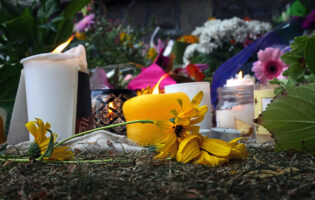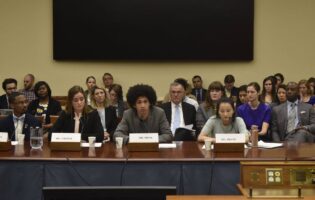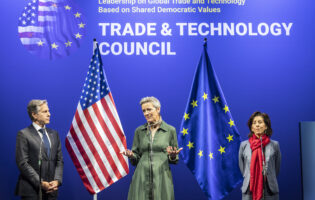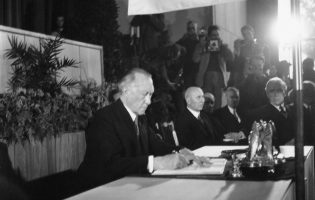
Ben Sutherland; Gage Skidmore; Mstyslav Chernov
The Dangers of Division: The Importance of Transatlantic Cooperation in a Changing Political Climate

Angela Stanzel
Institut Montaigne
Dr. Angela Stanzel is a Senior Policy Fellow in the Asia Program and the representative in Germany of Institut Montaigne. Before joining Institut Montaigne in December 2018, Angela worked as Senior Policy Fellow and editor of China Analysis in the Asia Program at ECFR. Prior to that, she worked for the Koerber Foundation (Berlin), GMF (Asia Program, Brussels), and for the German Embassy (cultural section, Beijing). Her recent policy papers include "Fear and loathing on the New Silk Road: Chinese security in Afghanistan and beyond" and "Geoeconomics at an Inflection Point," co-authored with David Livingston.
Her recent publications include: Fear and loathing on the New Silk Road: Chinese security in Afghanistan and beyond (2018), The Trump opportunity: Chinese perceptions of the US administration (2018), The United Nations of China: A vision of the world order (2018), China’s "New Era" with Xi Jinping characteristics (2017), Grand Designs: Does China have a 'Grand Strategy'? (2017), China and Brexit: what’s in it for us? (2016), A hundred think tanks bloom in China (2016), Absorb and conquer: An EU approach to Russian and Chinese integration in Eurasia (2016), Eternally displaced: Afghanistan’s refugee crisis and what it means for Europe (2016).
She was a 2017-2018 participant in AICGS’ project “A German-American Dialogue of the Next Generation: Global Responsibility, Joint Engagement,” sponsored by the Transatlantik-Programm der Bundesrepublik Deutschland aus Mitteln des European Recovery Program (ERP) des Bundesministeriums für Wirtschaft und Energie (BMWi).

Annika Frieberg
San Diego State University
Originally from Sweden, Annika Frieberg studied Modern and Central European History at the University of North Carolina-Chapel Hill. She teaches courses in 19th and 20th century European and East European history at San Diego State University. Her research and teaching interests center on war and genocide, gender, conflict resolution, media, national, and transnational questions in Central Europe. She has published several articles, including “Reconciliation Remembered. Early Activists and the Polish-German Relations” in Re-Mapping Polish-German Memory, which was published by Indiana University Press in 2011. She is the co-editor of Reconciling with the Past: Resources and Obstacles in a Global Perspective, published by Routledge in 2017. She is the author of Peace at All Costs: Catholic Intellectuals, Journalists, and Media in Postwar Polish-German Reconciliation, published by Berghahn Books in 2019.
She is a 2017-2018 participant in AICGS’ project “A German-American Dialogue of the Next Generation: Global Responsibility, Joint Engagement,” sponsored by the Transatlantik-Programm der Bundesrepublik Deutschland aus Mitteln des European Recovery Program (ERP) des Bundesministeriums für Wirtschaft und Energie (BMWi).

David Livingston
Atlantic Council
David Livingston is Deputy Director for Climate & Advanced Energy at the Atlantic Council. Previously, he was an associate fellow in the Carnegie Endowment’s Energy and Climate Program, where his research focuses on geoeconomics, markets, and risk. He is also a nonresident associate of Carnegie Europe in Brussels.
Previously, Mr. Livingston served as the inaugural Robert S. Strauss fellow for geoeconomics at the Office of the United States Trade Representative, where he concluded as acting Assistant U.S. Trade Representative for Congressional Affairs. He also has worked at the World Trade Organization in Geneva and at the United Nations Industrial Development Organization (UNIDO) in Vienna. Mr. Livingston is an alumnus of the Atlantik Brücke Young Leaders Program.
He is a 2017-2018 participant in AICGS’ project “A German-American Dialogue of the Next Generation: Global Responsibility, Joint Engagement,” sponsored by the Transatlantik-Programm der Bundesrepublik Deutschland aus Mitteln des European Recovery Program (ERP) des Bundesministeriums für Wirtschaft und Energie (BMWi).

Julie Hamann
German Council on Foreign Relations
Julie Hamann is research fellow at the German Council on Foreign Relations (DGAP). Her areas of focus are Franco-German relations, German and French foreign policy, and labor unions and social movements in France. She manages the Franco-German Future Dialogue. She studied political science and sociology at the Technische Universität Dresden and at the Institut d’Études Politiques in Lyon, and earned her MA in political science and international security from the Institut d’Études Politiques in Paris and the Freie Universität Berlin.
She is a 2017-2018 participant in AICGS’ project “A German-American Dialogue of the Next Generation: Global Responsibility, Joint Engagement,” sponsored by the Transatlantik-Programm der Bundesrepublik Deutschland aus Mitteln des European Recovery Program (ERP) des Bundesministeriums für Wirtschaft und Energie (BMWi).
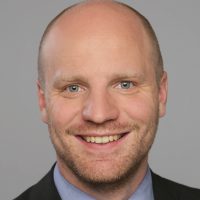
Niklas Helwig
Niklas Helwig was a DAAD/AICGS Research Fellow in October and November 2018. Prior to his research stay at the AICGS, he was a Transatlantic Post-Doc Fellow for International Relations and Security (TAPIR fellow). He was based at the RAND Corporation and the Center for Transatlantic Relations in DC, as well as at the German Institute for International and Security Affairs (SWP) in Berlin. Between 2014 and 2016. he worked as Senior Research Fellow at the Finnish Institute of International Affairs in Helsinki. Dr. Helwig was also a Visiting Researcher at the Centre for European Policy Studies in Brussels. He researched and taught at the University of Cologne and the University of Edinburgh, from where he received a double PhD (‘co-tutelle’). Dr. Helwig was a Marie Curie Early Stage Researcher in the Initial Training Network on EU external action (EXACT).
Dr. Helwig’s research interests include Germany’s foreign and security policy, European defense cooperation, transatlantic security cooperation, as well as the EU as a Global Actor. He wrote extensively for think tanks, online blogs, and academic journals, including European Foreign Affairs Review, The International Spectator, Internationale Politik und Gesellschaft, Huffington Post, EurActiv, and War on the Rocks.
During his time at the AICGS, Dr. Helwig analyzes U.S. domestic perception of the transatlantic alliance during the 2018 midterm elections. Lately, the U.S. administration emphasized a transactional perspective on the relationship with its allies. Historically, however, it can be argued that the transatlantic alliance was about more than economic prosperity and mutual defense, and instead based on a broader societal belief in shared values and identity. By analyzing the debates around midterm races across the U.S., the project aims to shed light on the question whether this notion still holds true in today’s America.
Additionally, he was a 2017-2018 participant in AICGS’ project “A German-American Dialogue of the Next Generation: Global Responsibility, Joint Engagement,” sponsored by the Transatlantik-Programm der Bundesrepublik Deutschland aus Mitteln des European Recovery Program (ERP) des Bundesministeriums für Wirtschaft und Energie (BMWi).
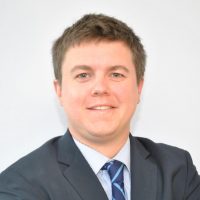
Peter Rough
Hudson Institute
Peter Rough has been a fellow at Hudson Institute in Washington, DC, since 2014. He writes and comments on U.S. foreign policy toward Europe and the Middle East and edited Hudson’s journal, Current Trends in Islamist Ideology. Prior to joining Hudson, Peter collaborated on a social history of World War I in the Middle East, A Land of Aching Hearts, published by Harvard University Press in fall 2014. A former associate director in the White House Office of Strategic Initiatives, he also served as director of research in the Office of George W. Bush, assisting the former president with his memoir, Decision Points.
Peter has completed stints as a policy analyst at the U.S. Agency for International Development and as an advisor to U.S. Army Special Operations Command. He also helped direct foreign policy working groups for the Romney and Rubio presidential campaigns, focusing on Russia and the Middle East, respectively. A proud native of Des Moines, Iowa, he is a graduate of the George Washington University and the Fletcher School of Law and Diplomacy, where he was a Cabot Corporation Scholar. He is a native German speaker.
He was a 2017-2018 participant in AICGS’ project “A German-American Dialogue of the Next Generation: Global Responsibility, Joint Engagement,” sponsored by the Transatlantik-Programm der Bundesrepublik Deutschland aus Mitteln des European Recovery Program (ERP) des Bundesministeriums für Wirtschaft und Energie (BMWi).
Policy Report 67
AGI is pleased to present the written results of the second year of its project “A German-American Dialogue of the Next Generation: Global Responsibility, Joint Engagement.” The six authors together with several other young Americans and Germans engaged with each other during the course of 2017/18 in discussions to identify solutions to global issues of concern for the transatlantic relationship. The purpose of the project is to emphasize the important role of the next generation of transatlantic leaders and experts and to give them a platform and voice in the critical dialogue of crucial global issues that require joint transatlantic attention and solutions.
The project participants come from a variety of disciplines and have a wide array of expertise. Representing the three AGI program areas—Foreign & Domestic Policy; Geoeconomics; and Society, Culture & Politics—the participants formulated a set of recommendations that were presented in a variety of venues and through innovative means. The essays presented in this Policy Report summarize the outcome of a year-long engagement with current critical transatlantic issues, which include challenges and opportunities related to trade policy and the imposition of tariffs, the digital transformation, the energy transition, European defense capabilities, and transatlantic security cooperation, as well as the role of civil society in conflict resolution.



